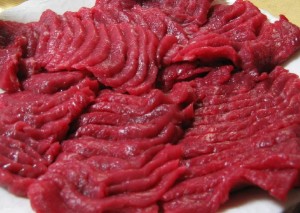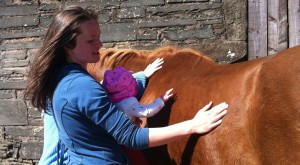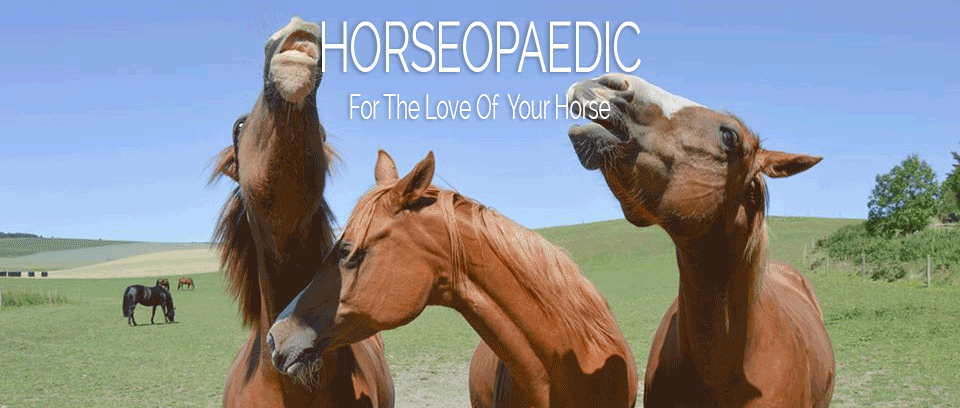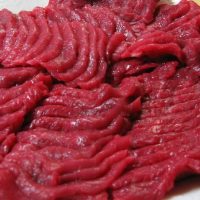 Ater the scandal in the UK regarding horse meat in the food chain, you’d think suppliers would learn their lessons.
Ater the scandal in the UK regarding horse meat in the food chain, you’d think suppliers would learn their lessons.
Now it seems that horse meat has been detected in two of 48 samples of ground meat products which were purchased from retailers in California.
The FDA have made it illegal for horse meat to enter the food chain in the United States.
A study was undertaken by researchers at the Food Science Program in California and the presence of horsemeat was detected in 2 samples.
The discovery comes after the 2013 horse-meat scandal in Europe, which saw a range of ready-made meals pulled from supermarket freezers across the continent. There were many beef products which were found to have been contaminated with horse meat.
This led to an international investigation which revealed how complex the food chain was and also how vulnerable to rogue traders.
Researchers at Chapman University have just published two separate studies exploring meat mislabeling in consumer products. One focused on the identification of the species found in ground meat products and the other investigated game meat species labeling.
These studies examined products sold in the US and identified mislabeling in both studies. In the study on identification of species found in ground meat products, 48 samples were purchased from five online specialty meat distributors and four retail outlets (three supermarkets and one butcher) in Orange County, California. The samples represented 15 different meat types.
Using a combination of DNA barcoding and real-time polymerase chain reaction (PCR) the samples were tested for the presence of horse, beef, chicken, lamb, turkey, and pork . Thirty-eight of these samples were found to have been labeled correctly, but also led to the discovery of horse meat in the food chain.
Ten specimens had been mislabeled and of these, nine were found to contain additional meat species. One sample was completely mislabeled and horse meat was detected in two of the samples.
Of the horse meat samples, one was labeled as ground bison, and the other as ground lamb meat. Both of these had been purchased from two different online specialty meat distributors.
The sample labeled as ground bison had a top match for American elk, but the analysis also revealed the presence of beef, pork, and horse.
The sample labeled as ground lamb was identified as lamb/sheep, but the analysis also revealed the presence of pork and horse.
The sample labeled as lamb listed the US as its country of origin, while the sample labeled as bison listed Canada as its country of origin.
“Although extensive meat species testing has been carried out in Europe in light of the 2013 horse-meat scandal, there has been limited research carried out on this topic in the United States,” noted Rosalee Hellberg, an assistant professor at Chapman University, and a co-author on both studies. To our knowledge, the most recent US meat survey was published in 1995.”
What the study speculates is, that the presence of many different species is more common in ground meat than previously though and suggests that there might be cross-contamination at the processing plant..
This mislabeling can occur unintentionally when proper cleaning isn’t carried out on the equipment between using different species of animals.different.
It’s also possible (suggested in the study) that lower cost species are intentionally mixed in with the higher cost one to increase the profit margins.
The study showed, that overall the mislabeling was more commonly found in meat products purchased from online specialty meat distributors as opposed to supermarkets. There was a 35% rate of mislabeling on products labeled as yak bear and black bear burgers. using on game meat species labeling, used a total of 54 game meat products collected from online retail sources in the United States. Of these 54 samples, a total of 22 different types of game meat were represented based on the product label. Like the previous study, the samples were tested using DNA barcoding.
The results showed 10 products to be potentially mislabeled. Two products labeled as bison and one labeled as yak were identified as domestic cattle. Other mislabeling included a product labeled as black bear that was identified as American beaver, and a product labeled as pheasant that was identified as helmeted guineafowl.
Additionally, there were also five products identified as a near threatened (bison) or threatened (lion) species and these were all determined to be correctly labeled and legally sold.
Game meats represent an important specialty market in the US with an estimate value of $US39 billion. According to the US Food and Drug Administration (FDA), game meats are defined as exotic meats, animals and birds, which are not in the Meat and Poultry Act.
Game meats produced in the US are regulated by the Department of Agriculture, while game meats imported into the US are regulated by the FDA.
Both studies were published in the journal Food Control.
Charles A. Quinto, Rebecca Tinoco, Rosalee S. Hellberg.
DNA barcoding reveals mislabeling of game meat species on the U.S. commercial market. Food Control, 2016; 59: 386 DOI:10.1016/j.foodcont.2015.05.043
Dawn E. Kane, Rosalee S. Hellberg.
Identification of species in ground meat products sold on the U.S. commercial market using DNA-based methods. Food Control, 2016; 59: 158 DOI:10.1016/j.foodcont.2015.05.020
Source: DNA testing reveals horsemeat in two products bought in US
 In some cultures, horsemeat (and dog meat) are seen as no different than eating beef or lamb for example. Do you view a horse as a pet and not to be eaten, or would you be quite happy to tuckin? This article is more about misleading labeling than the ethics of eating certain kinds of animals.
In some cultures, horsemeat (and dog meat) are seen as no different than eating beef or lamb for example. Do you view a horse as a pet and not to be eaten, or would you be quite happy to tuckin? This article is more about misleading labeling than the ethics of eating certain kinds of animals.
Would you like to know what’s in your burger, would it make a difference to your food choices? Or do you view all species the same, either to be eaten or not to be eaten?

